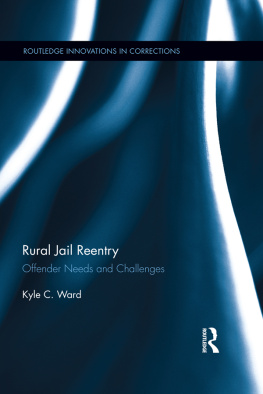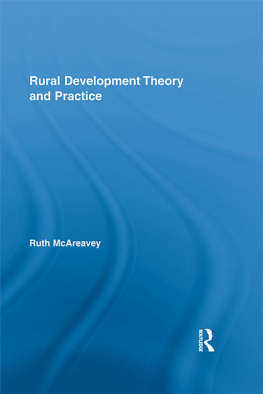To Mum and Dad who introduced me to England's green and pleasant land, with much love.
Neil
To Mum and Dad who introduced me to the joys of The Singing Postman, with much love.
Jon
Rural Racism
edited by
Neil Chakraborti and Jon Garland
First published by Willan Publishing 2004
This edition published by Routledge 2011
2 Park Square, Milton Park, Abingdon, Oxon OX14 4RN
711 Third Avenue, New York, NY, 10017, USA
Routledge is an imprint of the Taylor & Francis Group
the Editors and contributors 2004
All rights reserved; no part of this publication may be reproduced, stored in a retrieval system, or transmitted in any form or by any means, electronic, mechanical, photocopying, recording or otherwise without the prior written permission of the Publishers or a licence permitting copying in the UK issued by the Copyright Licensing Agency Ltd, 90 Tottenham Court Road, London W1P 9HE.
First published 2004
ISBN-10 1-84392-056-5
ISBN-13 978-1-84392-056-4
British Library Cataloguing-in-Publication Data
A catalogue record for this book is available from the British Library
Typeset by GCS, Leighton Buzzard, Bedfordshire
Project managed by Deer Park Productions, Tavistock, Devon
Contents
Neil Chakraborti and Jon Garland. |
Paul Cloke |
Philomena J.F. de Lima |
Dominic Malcolm |
Unravelling a stereotype: the lived experience of black
and minority ethnic people in rural Wales
Vaughan Robinson and Hannah Gardner |
Cultures of Hate in the urban and the rural: assessing the
impact of extremist organisations
Paul Iganski and Jack Levin |
Another Country? Community, belonging and exclusion in
rural England
Jon Garland and Neil Chakraborti |
Supporting victims of rural racism: learning lessons from a
dedicated racial harassment project
Shammi Jalota |
Kate Broadhurst and Andi Wright |
Richard Pugh |
Acknowledgements
A considerable debt of gratitude is owed to a great many people, without whose help and support the book would not have been completed. First and foremost, we would like to thank each of the contributors to this volume for providing us with such insightful material and for being a pleasure to work with. Thanks also to Brian Willan for his advice and thoughtful comments, and to Ben Bowling for interrupting his study leave in the sun by offering to help with the book.
Much of the thinking behind the book's conception was originally inspired by the editors' own research, and we are grateful to all those who helped us to develop our ideas. A special mention goes to Sam Johnson and his son for inadvertently paving the way for our initial research; to Mike Rowe for acting as an academic sounding-board to our various ramblings; to Parvinder Sandal and Katie Keetley whose assistance was greatly valued; to staff at Suffolk County Council's Community Safety Unit, as well as Ivan Balhatchet, Carolyn Went and Andy Johnson, for recognising the importance of this area of work; and to participants in our research studies, particularly minority ethnic households who were so open in sharing their harrowing experiences of victimisation with us.
Further inspiration for the book has come from our first-hand experiences of racism in the rural, and we are especially thankful for all the fan mail that we have received from Mr Death Incarnate [sic] and other critics. Thanks are also due to Derby County FC and Norwich City FC, the respective failures and successes of whom have provided the editors with rather contrasting emotions during the course of this book's completion.
Finally, our families and friends deserve enormous praise for their love and support during times of stress (of which there have been many) and for patiently listening to us when they would really have preferred not to.
And to Michele, Laura and Enrico: Tante grazie ai nostri amici viva la gnocca!
Foreword
by Ben Bowling
This is a valuable contribution to the literature on a set of complex issues that have long deserved far greater attention by academics and policymakers. The research set out in this book will chime with the experiences of black and brown-skinned people who have, like me, grown up or live in the British countryside. It will inform and stimulate students, academics and policy-makers to think afresh about rural racism. Collectively, the authors challenge prevailing assumptions, raise new themes and issues for research and point out new directions for politics, policy and practical action.
The book confronts the fact the while the ethnic minority population of Britain is concentrated in the urban sphere, people of colour can be found living in almost all parts of England, Scotland and Wales. Encouragingly, our presence in rural environments is increasing. The book engages with the paradox that black and brown people are often highly visible within rural towns and villages and yet seem invisible to policy-makers. As has long been accepted in the urban environment, diversity of physical appearance and cultural practice are also part and parcel of the rural landscape. Acknowledging this reminds us of the diversity of the white population and takes us past the widely held, but erroneous, assumption that if your skin is dark you must really be from somewhere else. It is now a simple empirical fact that you can be visibly different and yet still from Worcestershire, the Highlands of Scotland, the Welsh valleys or wherever.
The book challenges the curious belief that there cannot be racism in rural Britain because there are relatively few people of colour resident there. Many ethnic minority rural dwellers will know that the reverse is more to the point rural racism is one of the reasons that more people of colour do not choose to live outside the cities. At the same time, the book avoids characterising minorities as inherently victims, simply objects of hate and exclusion rather than complex, active subjects with diverse experiences both positive and negative of country life. It shows that people of African, Caribbean and Asian descent enjoy living in the countryside for the same reasons as their white counterparts the love of rural terrain, the availability of country pursuits and the emotional tranquillity that comes from living in a peaceful natural environment. It shows that many black and Asian people find themselves welcome in the rural environment and enjoy a contented life there. Nonetheless, the authors do not shy away from documenting the effect that racist violence and exclusion has on many people and how it can have deep psychological effects in itself and in the way that it echoes other aspects of racism in British society.
It is understandable that engagement with anti-racist politics has tended to focus on areas of extensive ethnic minority settlement; the cities are, after all, where the problem was thought to be located. This raises the question of how a politics based on respect for diversity and anti-racism can be mobilised in areas where there are few black and brown faces. This book shows that there is a real need to think about how best to respond to rural racism and how policy can meet the needs of individuals and families with diverse backgrounds. It can perhaps build on the shared experience articulated by both rural dwellers in general and individuals from minority ethnic communities of economic marginalisation, social isolation, poor infrastructure, absence of decent public services and invisibility in mainstream urbanist public debate. Together, the chapters of this book point to the need for an alternative politics emphasising a countryside of difference that will enable us to redraw the rural landscape in ways that reflect the experiences of all.





